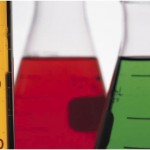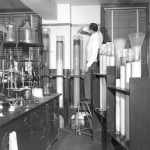 This week’s issue of Nature calls attention to a recently awarded NIH grant to promote diversity in the scientific workforce. In particular, this grant will fund Purdue University’s new Institute for Accessible Science, which aims to understand the obstacles that researchers with mobility or visual disabilities face, and to develop solutions that enable these researchers to perform laboratory work with as little assistance as possible. (Full article here on Purdue’s website.) It will be interesting to see what innovations come out of this grant. However, there’s a question that’s been lurking in the back of my mind for a while, and is brought to the forefront by the topic of disabled researchers:
This week’s issue of Nature calls attention to a recently awarded NIH grant to promote diversity in the scientific workforce. In particular, this grant will fund Purdue University’s new Institute for Accessible Science, which aims to understand the obstacles that researchers with mobility or visual disabilities face, and to develop solutions that enable these researchers to perform laboratory work with as little assistance as possible. (Full article here on Purdue’s website.) It will be interesting to see what innovations come out of this grant. However, there’s a question that’s been lurking in the back of my mind for a while, and is brought to the forefront by the topic of disabled researchers:
Why must aspiring science professors be exquisitely trained to do manual lab work when bench work won’t ultimately be in their job description as a professor?
It is commonly known that most chemistry professorsI can only speak confidently about chemistry, in particular organic, but I expect other scientific disciplines are similar at large research universities – once they get past their first few years – don’t do labwork anymore. Instead, their job entails overseeing their students’ research (typically from their desk), writing grants and journal articles, reviewing articles, performing teaching responsibilities, serving on committees, attending meetings and conferences, giving talks, and probably many more things that I don’t know about. Ironically, graduate school only indirectly prepares you for most of these things. Instead, PhD students in chemistry spend most of their time doing labwork.
 Thus, a chemist aspiring to a tenure track position at a big research school follows an unusual career path relative to most other professions. You must get a PhD to become a professor, but most of what you learn to do during the required training (PhD) will not ultimately be part of your job description.
Thus, a chemist aspiring to a tenure track position at a big research school follows an unusual career path relative to most other professions. You must get a PhD to become a professor, but most of what you learn to do during the required training (PhD) will not ultimately be part of your job description.
Now, I think I understand the merits of this set up. As graduate students struggle through the various frustrations and surprises of working at the bench, they are forced to learn the intimate details of their chemistry, thus becoming experts and honing their problem-solving skills. Furthermore, graduate students provide an irreplaceable workforce for academic research. Lastly, the 5+ years spent acquiring a PhD act as a sort of unspoken initiation period; everyone has to serve their time doing manual labor before they can be respected as a manager.
This system is generally quite accepted, and I would be hard-pressed to come up with a better way of doing things. But what would chemistry be like if E.J. Corey was born with some sort of mobility impairment that required the use of a wheelchair? The resulting difficulty in performing labwork would probably have kept him from pursuing an education in chemistry, which seems like an awful waste of a bright mind that is so skilled at solving chemistry riddles. The irony is that the tasks of a professor can all be performed from a wheelchair without too much difficulty.
Even with accessibility improvements to laboratories, there are still many lab techniques that a disabled person may never be able to accomplish. Is there some way to de-emphasize the necessity of lab work for a science PhD, at least in such circumstances, without opening a giant can of worms?

